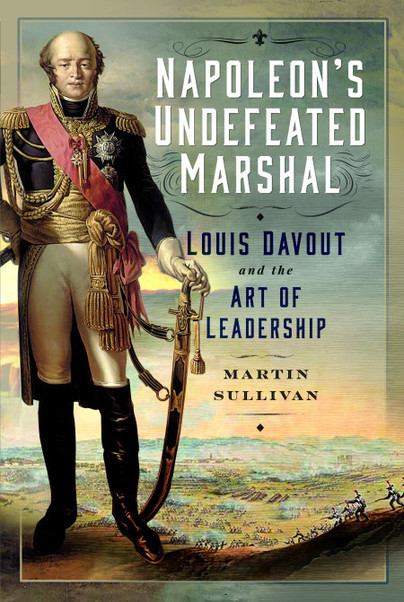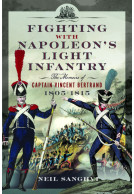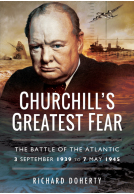Napoleon’s Undefeated Marshal (Hardback)
Louis Davout and the Art of Leadership
Imprint: Pen & Sword Military
Pages: 224
Illustrations: 12 mono illustrations
ISBN: 9781399053143
Published: 23rd September 2024
(click here for international delivery rates)
Order within the next 5 hours, 40 minutes to get your order processed the next working day!
Need a currency converter? Check XE.com for live rates
| Other formats available - Buy the Hardback and get the eBook for £1.99! | Price |
|---|---|
| Napoleon’s Undefeated Marshal ePub (14.9 MB) Add to Basket | £14.99 |
The war of 1809 between France and Habsburg Austria, culminating in the titanic battle of Wagram, has been described often as Napoleon’s last successful campaign. Napoleon said later that the manoeuvres and actions of the French army and their German allies in the opening two weeks of this conflict were among the most brilliant and skilful of his entire career. But matters might have gone very differently. A series of miscalculations, mistakes and poor communications, both prior to Austria’s declaration of war and in the early days of hostilities, might have resulted in a major setback, if not a disaster, for the French Emperor. That they did not is due in large part to the decisions and actions of Marshal Louis Davout, the so-called “Iron Marshall”
This is the first English study of Marshal Davout's command and leadership in over fifty years. Little known outside of France, Louis Davout was one of the finest generals in Napoleon's army, as evidenced by his comprehensive defeat of the main Prussian force at Auerstadt in October 1806. A hard, even harsh, disciplinarian, an utterly ruthless opponent on the field of battle, Davout was also a loving family man, meticulously concerned for the health and well-being of his troops, and able to command the loyalty of his divisional commanders for far longer than any of his contemporaries.
In this new study, Martin Sullivan describes in detail the decision-making processes and actions of Marshal Davout, and from this analysis illustrates leadership concepts and theories which remain relevant to the world of today. Focusing upon the opening phase of the Wagram campaign, he examines in detail the decisions and actions of the participants, Davout, his opponent the Archduke Charles, and Napoleon himself. By this method the art of leadership may be seen exercised in the heat of an intense and deadly conflict.
"Successful on its own terms, the book is also highly accessible. Sullivan means to be understood, and his passion for and intimate knowledge of the period are clear." Book review: [https://the-past.com/review/books/napoleons-undefeated-marshal-louis-davout-and-the-art-of-leadership/]
The Past
As featured in
Military History Matters - Issue 144, February/March 2025
"This new study chronicles the life of a complex figure who came to be known as the 'Iron Marshal'."
Military History Matters - Issue 143, December 2024/January 2025
In his Acknowledgements the author states that ‘the idea behind this book…came not from my historical reading but from my experience as an MBA student in Switzerland and later careers in eurocurrency lending, the investment finance business, and as a lecturer. I have studied management and dealt with many corporate executives, civil servants and government ministers…this book makes no claim to be a piece of original historical research. It is rather a case study in leadership, specifically that of Louis Davout, who is so little known outside France but who I can picture very well as the hard-driving CEO of a modern and very successful multinational business organization.’
Miniature Wargames
The first chapter gives some details of Davout’s early life, describes the background to the 1809 campaign and the major problem facing the French high command. The second describes the events of the first week of the war as Habsburg forces advanced into Bavaria. The third and fourth chapters describe the arrival of Napoleon and his recapture of the vital Danube bridging stronghold of Regensburg (Ratisbon) on 23rd April. The author gives a detailed account of Davout’s role before and during the opening phases of the 1809 Danube Campaign.
Six maps show the Region of War: Bavaria and the Upper Danube Valley and the deployment of opposing forces on 15th April 1809; Ratisbon and Vicinity 1809: Situation at noon, 19 April and Movements since 17 April; Campaign of 1809 Ratisbon phase: Battle of Abensburg 20 April; Situation about midnight 21-22 April; Situation about midnight 21-22 April and Movements since 19 April; and Battle of Eggmuhl 22 April.
Eight pages of monochrome plates contain reproductions of a view of the Danube and the Regensburg bridge; cavalry combat Eckmuhl; a portrait of Davout; a painting of a fictitious meeting between Napoleon and Archduke Charles in 1808; portraits of 3rd Corps division commanders Saint Hilaire, Gudin, Montbrun, Friant and Morand; a portrait of Archduke Charles; Marshal Lannes at Ratisbon, and a modern photograph of the Regensburg bridge.
The last two chapters are entitled The Nature of Leadership: Theory v. Practice and Relevance for Management Today. The former makes some interesting points, but the very nature of tabletop wargames makes them largely irrelevant; one can, for example, like Davout take good care of one’s miniature troops, by careful painting and varnishing, and by wrapping them in cotton wool when in their boxes, but will that effort always be rewarded by successful die rolls when their morale is tested? Readers of this magazine who are Napoleonic wargamers and – contrary to the author’s earlier suggestion - are very familiar with Marshal Davout, may prefer to skip the latter.
The book concludes with five pages of endnotes; a three-page bibliography; twenty-six pages of useful biographical notes on the key figures; a two-page Glossary of Military Terms, which should really have preceded the text; and a six-page index.
The narrow focus upon a short period of Davout’s career, and the space devoted to drawing lessons in the art of leadership for managers and chief executives, probably make this a book that even wargamers with a particular interest in the Ratisbon phase of the Danube Campaign of 1809 may prefer to borrow from a library, rather than to buy. Whether it has anything new to offer in the way of advice on management for today’s executives is a matter upon which I do not feel qualified to comment.
Louis Davout is often overlooked in discussions of Napoleon’s marshals. Perhaps not as quintessentially dashing as Murat or as suicidally daring as Ney, Davout was nevertheless a loyal, and above all, successful marshal who is deserving of this new, and very detailed analysis.
Andrew Johnson, University of Bolton Manchester, October 2024
Martin Sullivan has produced a valuable piece of work in this book, which is part biography, part historical narrative, and part leadership analysis. The work uses the campaign of 1809 and the key battle of Wagram as a vehicle to demonstrate the personal competency of Davout as a field commander, along with key lessons of senior leadership, which might be equally applied to business and management in the modern world, as much as to a Napoleonic battlefield.
The narrative is clear, logical, and well-paced, and the explanation of this complex campaign is aided enormously by two useful tactics. Firstly, the author has included, at regular intervals, the correspondence written and shared by the key figures with their fellow commanders in the field, and these original sources add valuable context to the decisions made throughout the campaign. The correspondence helps to highlight the ‘frictions of war’ as Clauswitz termed them; the lack of information, the obstacles of time, distance, terrain, and weather, amongst many others.
Secondly, the author has included a series of summary tables, which serve to clarify orders of battle and locations/movements of the major formations at various points in the campaign. These provide useful way-points for the reader as they navigate through the narrative of the action.
What is especially nice to see in this work, is that the author has avoided the sneering judgemental approach which some historians sadly revert to. Martin Sullivan is highly analytical and incisive in his judgements, but without the high-minded condescension that can often accompany reviews of historical military events. Rather, the author is even-handed and recognises the frustrations and frictions of military campaigning in an age before the advent of instant communication technology.
The author also highlights the importance of ‘doing the groundwork’ as a leader. In the case of Davout, he highlights the fact that, in addition to being decisive and effective on the battlefield, Davout spent the months of peace training and developing his troops, and ensuring their welfare and provisioning. It demonstrates that Davout was an all-rounder, who viewed military command holistically. The author also highlights Davout’s ruthless nature with his insistence on strict discipline. This should not come as any surprise. The most effective military leaders are those that can combine this single-minded efficiency and effectiveness with a genuine care for their troops. The two approaches are not mutually exclusive, but rather a powerful combination, and Davout fused these two aspects of leadership perfectly.
Martin Sullivan should be commended for his detailed, enlightening work, which has been exhaustively researched. This book is a valuable addition to the literature on the Napoleonic period. Whether you are a historian, serving military leader, or even a wargamer, there is plenty in this book to keep you turning the pages and there is good reason for it to have a prominent place on your bookshelf.
About Martin Sullivan
Martin Sullivan holds a BA in History and Philosophy from the University of East Anglia and an MBA from IMD in Lausanne, and studied for a 2nd BA in Law at Harris Manchester College, Oxford. He has always had a particular interest in the Napoleonic period and has been studying the life and career of Marshal Davout for over 15 years. He also has many years experience in banking and finance in both the UK and the Arabian Gulf and direct experience of management decision making.















